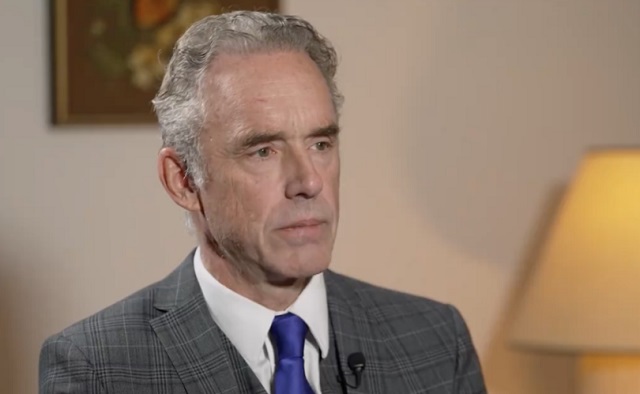Business
$1.4 billion per year: Jordan Peterson calls for end to Trudeau’s massive CBC funding

From LifeSiteNews
Dr. Jordan Peterson has pointed out that the Canadian Broadcasting Corporation (CBC), which receives over a billion dollars in taxpayer funds each year, has garnered less than 100 viewers on its last 19 videos, and therefore believes it should be defunded.
In an August 31 post on X, Peterson, a best-selling Canadian author and clinical psychologist, implied that that the CBC is massively overfunded considering its dismal engagement numbers with the public.
“1.4 billion per year: CBC subsidies from @JustinTrudeau,” Peterson wrote. “Not counting paid ads.”
1.4 billion per year: CBC @CBC subsidies from @JustinTrudeau
Not counting paid ads
The last 19 CBC video releases on @YouTube have
<100 views
EachThat's $14 000 000 per viewer
Let that sink inTake note @PierrePoilievre
Defund the CBC
— Dr Jordan B Peterson (@jordanbpeterson) August 31, 2024
“The last 19 CBC video releases on @YouTube have <100 views Each,” he continued. “That’s $14 000 000 per viewer. Let that sink in.”
Peterson further called on Conservative Party leader Pierre Poilievre to hold to his promise to “Defund the CBC,” if he is elected prime minister.
A screen shot posted on X from the same day as Peterson’s post shows CBC’s latest videos receiving between nine and just under two hundred views.
Wow! You weren't kidding, Jordan, and it doesn't get any better as you scroll down their 'Latest videos' page. This is brutal, not to mention highly humiliating for a so called 'mainstream national TV network'. pic.twitter.com/X6BtrGhXU8
— Shaun Rickard (@ShaunRickard67) August 31, 2024
Regardless of their low viewership, the CBC continues to receive massive subsidies from Prime Minister Justin Trudeau’s Liberal government. Many independent media outlets and Conservative Party politicians, including Poilievre, have accused the outlet of bias and partisanship because of this dependency on government.
Despite these concerns, the Trudeau government has only poured money into the outlet. Beginning in 2019, Parliament changed the Income Tax Act to give yearly rebates of 25 percent for each news employee in cabinet-approved media outlets earning up to $55,000 a year, to a maximum of $13,750.
The Canadian Heritage Department since admitted that the payouts are not sufficient to keep legacy media outlets running, and even recommended that the rebates be doubled to a maximum of $29,750 annually.
Last November, Trudeau again announced increased payouts for legacy media outlets, payouts which coincidence with the lead-up to the 2025 election. The subsidies are expected to cost taxpayers $129 million over the next five years.
Similarily, Trudeau’s 2024 budget outlined $42 million in increased funding for the CBC for 2024-25.
The $42 million to the CBC is in addition to massive media payouts which already make up roughly 70 percent of its operating budget, and total more than $1 billion annually.
Automotive
Auto giant shuts down foreign plants as Trump moves to protect U.S. industry

 MxM News
MxM News
Quick Hit:
Stellantis is pausing vehicle production at two North American facilities—one in Canada and another in Mexico—following President Donald Trump’s announcement of 25% tariffs on foreign-made cars. The move marks one of the first corporate responses to the administration’s push to bring back American manufacturing.
Key Details:
-
In an email to workers Thursday, Stellantis North America chief Antonio Filosa directly tied the production pause to the new tariffs, writing that the company is “continuing to assess the medium- and long-term effects” but is “temporarily pausing production” at select assembly plants outside the U.S.
-
Production at the Windsor Assembly Plant in Ontario will be paused for two weeks, while the Toluca Assembly Plant in Mexico will be offline for the entire month of April.
-
These plants produce the Chrysler Pacifica minivan, the new Dodge Charger Daytona EV, the Jeep Compass SUV, and the Jeep Wagoneer S EV.
Diving Deeper:
On Wednesday afternoon in the White House Rose Garden, President Trump announced sweeping new tariffs aimed at revitalizing America’s auto manufacturing industry. The 25% tariffs on all imported cars are part of a broader “reciprocal tariffs” strategy, which Trump described as ending decades of globalist trade policies that hollowed out U.S. industry.
Just a day later, Stellantis became the first major automaker to act on the new policy, halting production at two of its international plants. According to an internal email obtained by CNBC, Stellantis North American COO Antonio Filosa said the company is “taking immediate actions” to respond to the tariff policy while continuing to evaluate the broader impact.
“These actions will impact some employees at several of our U.S. powertrain and stamping facilities that support those operations,” Filosa wrote.
The Windsor, Ontario plant, which builds the Chrysler Pacifica and the newly introduced Dodge Charger Daytona EV, will shut down for two weeks. The Toluca facility in Mexico, responsible for the Jeep Compass and Jeep Wagoneer S EV, will suspend operations for the entire month of April.
The move comes as Stellantis continues to face scrutiny for its reliance on low-wage labor in foreign markets. As reported by Breitbart News, the company has spent years shifting production and engineering jobs to countries like Brazil, India, Morocco, and Mexico—often at the expense of American workers. Last year alone, Stellantis cut around 400 U.S.-based engineering positions while ramping up operations overseas.
Meanwhile, General Motors appears to be responding differently. According to Reuters, GM told employees in a webcast Thursday that it will increase production of light-duty trucks at its Fort Wayne, Indiana plant—where it builds the Chevrolet Silverado and GMC Sierra. These models are also assembled in Mexico and Canada, but GM’s decision suggests a shift in production to the U.S. could be underway in light of the tariffs.
As Trump’s trade reset takes effect, more automakers are expected to recalibrate their production strategies—potentially signaling a long-awaited shift away from offshoring and toward rebuilding American industry.
Business
‘Time To Make The Patient Better’: JD Vance Says ‘Big Transition’ Coming To American Economic Policy

JD Vance on “Rob Schmitt Tonight” discussing tariff results

From the Daily Caller News Foundation
By Hailey Gomez
Vice President JD Vance said Thursday on Newsmax that he believes Americans will “reap the benefits” of the economy as the Trump administration makes a “big transition” on tariffs.
The Dow Jones Industrial Average dropped 1,679.39 points on Thursday, just a day after President Donald Trump announced reciprocal tariffs against nations charging imports from the U.S. On “Rob Schmitt Tonight,” Schmitt asked Vance about the stock market hit, asking how the White House felt about the “Liberation Day” move.
“We’re feeling good. Look, I frankly thought in some ways it could be worse in the markets, because this is a big transition. You saw what the President said earlier today. It’s like a patient who was very sick,” Vance said. “We did the operation, and now it’s time to make the patient better. That’s exactly what we’re doing. We have to remember that for 40 years, we’ve been doing this for 40 years.”
“American economic policy has rewarded people who ship jobs overseas. It’s taxed our workers. It’s made our supply chains more brittle, and it’s made our country less prosperous, less free and less secure,” Vance added.
Vance recalled that one of his children had been sick and needed antibiotics that were not made in the United States. The Vice President called it a “ridiculous thing” that some medicines invented in the country are no longer manufactured domestically.
“That’s fundamentally what this is about. The national security of manufacturing and making the things that we need, from steel to pharmaceuticals, antibiotics, and so forth, but also the good jobs that come along when you have economic policies that reward investing in America, rather than investing in foreign countries,” Vance said.
WATCH:
With a baseline 10% tariff placed on an estimated 60 countries, higher tariffs were applied to nations like China and Israel. For example, China, which has a 67% tariff on U.S. goods, will now face a 34% tariff from the U.S., while Israel, which has a 33% tariff, will face a 17% U.S. tariff.
“One bad day in the stock market, compared to what President Trump said earlier today, and I think he’s right about this. We’re going to have a booming stock market for a long time because we’re reinvesting in the United States of America. More importantly than that, of course, the people in Wall Street have done well,” Vance said.
“We want them to do well. But we care the most about American workers and about American small businesses, and they’re the ones who are really going to benefit from these policies,” Vance said.
The number of factories in the U.S., Vance said, has declined, adding that “millions of workers” have lost their jobs.
“My town [Middletown, Ohio], where you had 10,000 great American steel workers, and my town was one of the lucky ones, now probably has 1,500 steel workers in that factory because you had economic policies that rewarded shipping our jobs to China instead of investing in American workers,” Vance said. “President Trump ran on changing it. He promised he would change it, and now he has. I think Americans are going to reap the benefits.”
-

 2025 Federal Election2 days ago
2025 Federal Election2 days agoMORE OF THE SAME: Mark Carney Admits He Will Not Repeal the Liberal’s Bill C-69 – The ‘No Pipelines’ Bill
-

 Automotive2 days ago
Automotive2 days agoTrump Must Act to Halt the Tesla Terror Campaign
-

 Break The Needle2 days ago
Break The Needle2 days agoWhy psychedelic therapy is stuck in the waiting room
-

 2025 Federal Election2 days ago
2025 Federal Election2 days ago‘Coordinated and Alarming’: Allegations of Chinese Voter Suppression in 2021 Race That Flipped Toronto Riding to Liberals and Paul Chiang
-

 2025 Federal Election2 days ago
2025 Federal Election2 days agoThree cheers for Poilievre’s alcohol tax cut
-

 2025 Federal Election1 day ago
2025 Federal Election1 day ago‘I’m Cautiously Optimistic’: Doug Ford Strongly Recommends Canada ‘Not To Retaliate’ Against Trump’s Tariffs
-

 Alberta1 day ago
Alberta1 day agoBig win for Alberta and Canada: Statement from Premier Smith
-

 2025 Federal Election2 days ago
2025 Federal Election2 days agoDon’t let the Liberals fool you on electric cars





